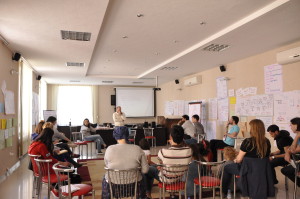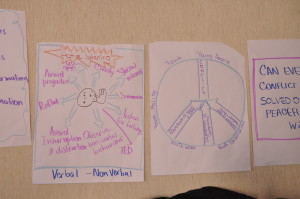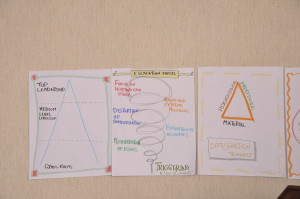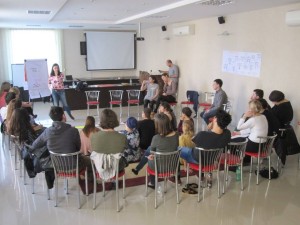Peace through Education
22:24, April 26, 2016 | News, Own news On April 10-18, 2016, Georgia hosted the first training workshop of “Education for Peace – Competences for Peace Education in the Youth Field” educational project attended by 3 representatives from each of the countries below: European countries: Great Britain, Netherlands, Germany, Latvia, Ukraine, and 3 South Caucasus countries: Armenia, Georgia and Azerbaijan.
On April 10-18, 2016, Georgia hosted the first training workshop of “Education for Peace – Competences for Peace Education in the Youth Field” educational project attended by 3 representatives from each of the countries below: European countries: Great Britain, Netherlands, Germany, Latvia, Ukraine, and 3 South Caucasus countries: Armenia, Georgia and Azerbaijan.
The Project is carried out by European Intercultural Forum functioning in Germany and Academy for Peace and Development functioning in Georgia, within Erasmus + European Union Program.
With the help of the Project, the partner organizations seek to contribute to the development of peace education, combating violence and gaining skills of conflict transformation and peaceful settlement among the society and particularly young people in conflict areas, which is of utmost importance for building and developing mutual trust and dialogue between isolated societies. One of the objectives of the Project is to prepare young trainers who will hold peace-building trainings in their own regions. The training course consists of 4 stages, 2 of which are held online, and the other 2 are held through mutual meetings.
Also, the Project makes it possible to build links between young people in the conflict area and carry out joint projects in the future, which can promote exceptionally peaceful resolution of open conflicts.
The first day of the training started with the participants meeting and getting acquainted with each other; this process was facilitated with various interesting methods. The participants shared the experience of their organizations in implementation of peace-building projects.
The organizers presented to the participants the plan of activities for the coming 7 days, and the participants shared their expectations from the training course and the fields and opportunities for further application of the skills they gained during the course.
To foster the team spirit among the participants, various team activities, discussions and games were coordinated. During the working discussions, the Project participants shared both various conflict situations faced by them in person, and the conflicts in their county or region. Then based on the theoretical knowledge they gained and various methods of conflict study, they tried to analyze such conflicts and conflict situations and reveal their causal links through teamwork, practical activities and games. Throughout the practical trainings, the young people worked out strategies for resolution of conflicts based on the theoretical knowledge gained.
The discussions and joint activities also continued during the breaks.
 During the following days of the training course, the participants learnt the concepts below: conflict, violence, peace, etc. through relevant films, theoretical materials and psychological analyses.
During the following days of the training course, the participants learnt the concepts below: conflict, violence, peace, etc. through relevant films, theoretical materials and psychological analyses.
Apart from the training, the participants enjoyed engaging leisure.
The Project was a real success, and the objectives were achieved step by step; this was emphasized both by the program participants, and trainers and organizers.
The training course made it possible for the young representatives of conflicting societies to view each other as peace-builders rather than enemies and granted them an opportunity to cooperate and make their own contribution to peace-building.
